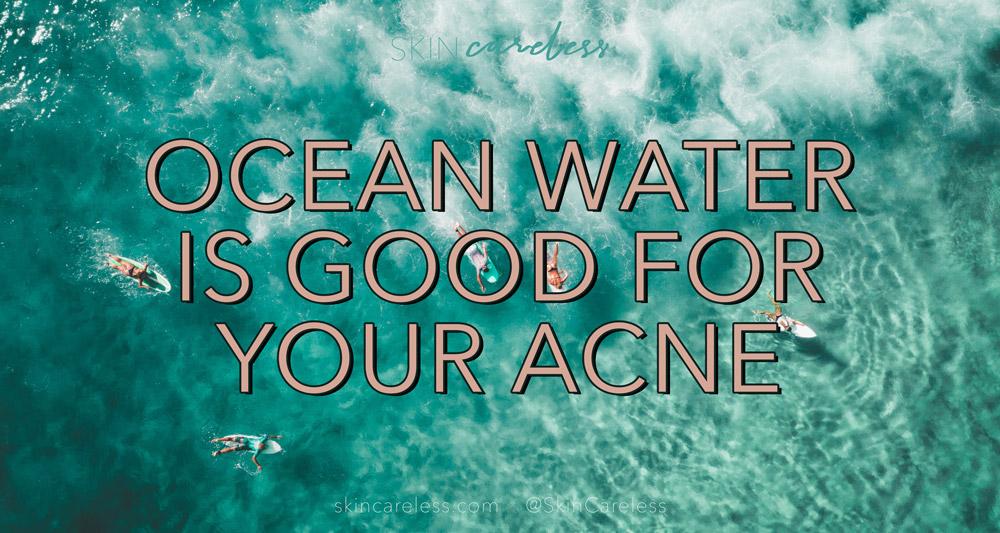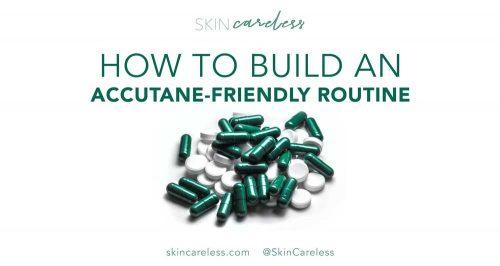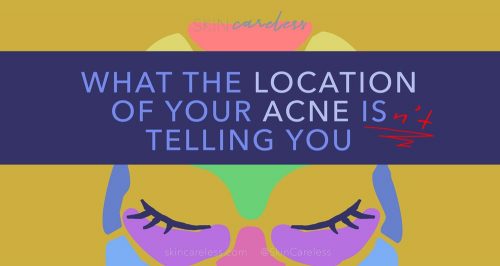I bet that you’ve experienced it – after a holiday on the beach, where you enjoyed the sun and the surf and some much needed relaxation, you come home only to notice that it looks like your skin’s cleared up. But how can that be?
You’re not imagining things – many people report that after going to the beach – even with its harsh sun and salty sea spray – their skin counterintuitively looks healthier and acne is reduced.
But what is it exactly that’s helping your skin out and how? Let’s dive in to the two nitty gritty of the two reasons why being at the beach improves acne.
Salt (that’s right – the seasoning)
When you dip in the ocean, you’re immersing your skin in a super-saturated salt water solution. The salt in seawater is doing a number of beneficial things to fight acne.
Firstly, salt is antibacterial. And acne is primarily a bacterial condition, usually treated with bactericides like benzoyl peroxide. Much like you can use a saltwater gargle for a sore throat or toothache, salt water treats acne bacteria in a similar way. Salt is used in all kinds of ways to prevent bacterial growth. Think to the last cured meat sandwich, brined fish or corned beef dinner you ate. High concentrations of salt prevent growth of bacteria and mould. This is because salt pulls water out from the cell of these organisms via osmosis. Without water, the bacteria die. A similar effect happens to the bacteria when you expose skin infections and even acne to salty water.
Secondly, salt has also been shown to have an emollient effect and reduce trans epidermal water loss, and has even been found effective in treating eczema. This includes a reduction in irritation, redness, dryness and itching. In this way it might approve the appearance of irritated acne lesions.
These benefits are not just limited to salt, however. Other minerals such as magnesium, potassium and more are thought to be even better for skin. This mineral rich water is found in certain seas like the dead sea or deep ocean. Many people swear by bathing in mineral-rich water.
You can create your own salt water solution in the bath by using epsom magnesium salts, or try out a spray for the face like Serozinc Toner for Oily Skin by La Roche-Posay.
Keep in mind however that the downside is that salt can sometimes feel drying to the skin. This might not be a viable long term treatment and you should be very conscious of properly moisturising after swimming in the ocean.
Sun
(gasp!)
I know, I know, it goes against everything I’ve ever said. But the sun does have some good qualities (like fighting vitamin D deficiency).
Sunlight and other forms of light can be a powerful influence on our skin’s health, because it has the ability to penetrate through the surface of your skin. This can be bad (read: skin cancer) or for good.
When we’re talking about acne fighting properties, you need to know a little about ultraviolet rays.
Invisible ultraviolet light emitted by the sun has an antibacterial effect and destroys the bacteria that causes acne. It does this by triggering a reaction that damages their DNA and prevents duplication. That’s actually the same damaging effect it has on our own cells, too.
UV light is so powerful and effective that it is used industrially from water and air purification to surgical tool sterilisation.
The beach is an ideal place for maximum sun exposure to benefit from UV rays, as the light coloured sand and the water both reflect a huge portion of UV light. This is exactly the reason why wearing a hat won’t prevent a sunburn at the beach, but for the purposes of acne fighting that’s exactly what you want.
Of course, always remember to apply and reapply sunscreen at the beach. This will still allow you to reap the benefits of sun exposure without the permanent skin damage along with it. None of the temporary improvement in your acne will be worth it if it’s accompanied by lifelong sun damage. My latest SPF love that won’t remind you of typical zinc-stick sunscreen is MISSHA All Around Safe Block Essence Sun Milk.
As with everything, use moderation. It’s not healthy to be at the beach day in and day out, but it’s also not healthy to never get out and enjoy what life has to offer, and make some sweet vitamin D and maybe get some clearer skin out of it.
So next time you’re at the beach, soaking up the sun and the waves, think about some of the ways it could be benefiting your skin. I personally consider a yearly vacation part of my ongoing skin care routine 😉





